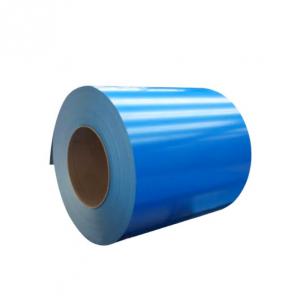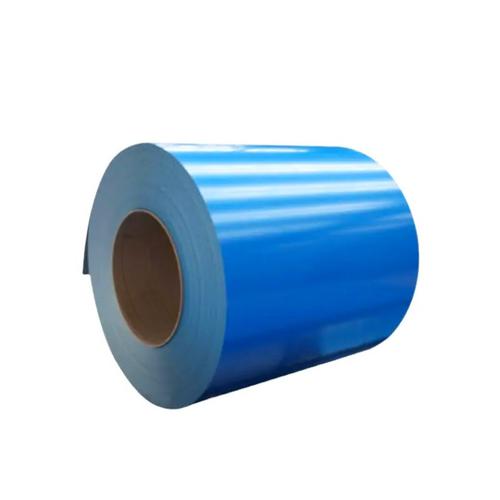PE PVDF Color-coated Aluminum Coil 1100 3003 5052 5083 Construction/Transportation/Packaging
- Loading Port:
- Qingdao
- Payment Terms:
- TT OR LC
- Min Order Qty:
- 1 T
- Supply Capability:
- 200 T/month
OKorder Service Pledge
OKorder Financial Service
You Might Also Like
Specification
What is color-coated aluminum coil?
After the aluminum coil is cleaned, chromized, roller-coated, and baked, the surface of the aluminum coil is coated with paint of various colors, which is color-coated aluminum coil.
Colored aluminum is widely used in aluminum-plastic panels, honeycomb panels, insulation panels, aluminum curtain walls, blinds, roller shutters, aluminum-magnesium-manganese roofing systems, aluminum ceilings, household appliances, downspouts, aluminum cans and many other fields due to its advantages of light texture, bright colors, easy processing and no rust.
Classification of color-coated aluminum coils:
1. Due to different processing processes and purposes of use, it can be simply divided into:
Because of the paint applied on the surface, it is divided into polyester (PE) coated aluminum coils and fluorocarbon (PVDF) coated aluminum coils; epoxy roller-coated aluminum coils. Of course, there are also cases where one side is coated with fluorocarbon and the other side is coated with polyester; there are even cases where both sides are coated with fluorocarbon;
2. Coating thickness:
Single coating (4-20 microns); double coating (25-28 microns); triple coating (35-38 microns)
3. Surface pattern:
Also known as wood grain aluminum coil, stone grain aluminum coil, brick pattern, camouflage aluminum coil, fabric aluminum coil, etc.!
4. Application:
Roofing material (aluminum magnesium manganese roofing system), ceiling material (aluminum alloy ceiling), brushed plate (surface brushed), etc.
Advantages of color-coated aluminum coil:
1. Light weight: The density of aluminum is only 1/3 of that of steel, which is convenient for transportation and construction.
2. Strong corrosion resistance: The surface coating can effectively resist erosion by environmental factors such as wind, rain, and ultraviolet rays.
3. Diverse colors: Various colors and patterns can be customized according to needs to enhance the decorative effect.
4. Excellent processing performance: Easy to bend, stamp, cut and form to meet diverse design needs.
5. Good temperature resistance: The melting point of aluminum is 660 degrees, and the general temperature cannot reach its melting point.
6. Environmental protection: Aluminum can be 100% recycled, which meets the requirements of sustainable development.
Coated aluminum alloy coil specifications:
| Alloy | 1050, 1060, 1070, 1100, 1145, 1200, 3003, 3004, 3005,3105, 5005, 5052, 5083, 5182, 5754, 6061, etc. |
| Temper | O, H12, H14, H16, H18, H22, H24, H26, H34, H32, H36, H111, H112, etc. |
| Thickness | 0.25-4.5mm |
| Width | 100-1600mm |
| Length | 100-16000mm |
| Material process | CC/DC |
| Coating material | polyvinylidene fluoride, polyethylene, epoxy resin, polyurethane |
| Color | red, blue, yellow, orange, green, etc. RAL Color or customization |
| Application | construction, aluminum-plastic panels, decoration, roofs, molds, automobiles, lighting, electronic products, etc. |
| MOQ | 1-3 tons |
Application of coated aluminum coils:
1. Construction field: used as exterior walls, roofs, curtain walls, etc., providing rich colors and styling designs, commonly seen in commercial projects and gymnasiums.
2. Home appliance field: used for home appliance housings such as refrigerators and air conditioners, with beautiful appearance and corrosion resistance.
3. Advertising field: making billboards and signboards, colorful and durable, suitable for outdoor use.
4. Electronic and electrical field: used for computer cases and electrical panels, with conductivity and heat dissipation, protecting internal components.
5. Transportation field: used for the housings of vehicles such as cars and trains, lightweight to improve fuel efficiency.
6. Other fields: used in luggage, solar reflectors and air conditioning ducts, etc., showing broad prospects.
Why choose Hongchang Aluminum?
1. Large scale: has two major production bases in Gongyi and Zhengzhou, Henan, employing hundreds of high-tech technicians.
2. Advanced technology: introduces advanced foreign technology and conducts research and development through field operations.
3. Direct hit the bottom price: direct sales by manufacturers, eliminating middlemen, customers can enjoy affordable prices.
4. Independent logistics: provide logistics arrangements, customers can choose customized logistics methods.
5. Perfect after-sales: provide long-term tracking and return visits, and solve customer problems in time.





Packaging:
The board/roll is placed on an iron or wooden pallet, perfectly wrapped with waterproof kraft paper, and then fixed with an iron narrow band.

- Q: Can aluminum coils be used in solar panel installations?
- Indeed, solar panel installations can make use of aluminum coils. The lightweight properties, corrosion resistance, and remarkable thermal conductivity of aluminum make it a favored material for constructing solar panels. Frequently, aluminum coils are employed as the supportive backing material for solar panels, ensuring both structural stability and effective heat dissipation. Additionally, these coils are commonly utilized in the production of solar mounting systems, which securely hold the panels in position. All in all, aluminum coils present a dependable and efficient choice for solar panel installations.
- Q: Are aluminum coils suitable for architectural louvers?
- Yes, aluminum coils are suitable for architectural louvers due to their lightweight nature, durability, and corrosion resistance. They can be easily shaped and formed into various louver designs, providing both functionality and aesthetic appeal to architectural structures.
- Q: This question asks for a comparison of the benefits and drawbacks of utilizing spring steel wire coils.
- <p>Spring steel wire coils offer several advantages such as high strength and durability, making them ideal for applications requiring resilience and resistance to deformation. They are also known for their excellent elasticity, which allows for consistent performance in dynamic applications. Additionally, spring steel wire coils can be easily formed into various shapes, providing versatility in design and functionality. However, they also have disadvantages, including potential for corrosion if not properly treated, and they can be more expensive than other types of wire due to the material's properties. Furthermore, spring steel wire coils may require specialized tools and equipment for handling and installation, adding to the cost and complexity of their use.</p>
- Q: What are the different thickness options for aluminum coils?
- Various industrial and commercial applications can be catered to with a wide range of thickness options for aluminum coils. The thickness of these coils is typically measured in gauge or millimeters (mm). Aluminum coils are available in different thickness options: 1. Thin Gauge: Coils with a thin gauge usually have a thickness ranging from 0.15 mm to 0.4 mm. These coils are commonly utilized in applications that necessitate lightweight and flexible materials, such as packaging, electrical wiring, and insulation. 2. Standard Gauge: Coils with a standard gauge have thicknesses ranging from 0.4 mm to 2.5 mm. They find widespread use in industries like construction, automotive, and aerospace for applications like roofing, cladding, heat exchangers, and structural components. 3. Thick Gauge: Coils with a thick gauge typically have a thickness above 2.5 mm. These coils are predominantly employed in heavy-duty applications that require high strength, durability, and load-bearing capacity. Examples include shipbuilding, industrial machinery, and large-scale structural frameworks. It is important to note that the availability of specific thickness options may vary depending on the manufacturer and the intended application. Additionally, custom thicknesses can be manufactured to meet specific project requirements.
- Q: Can aluminum coils be used in automotive applications?
- Yes, aluminum coils can be used in automotive applications. Aluminum is a lightweight and corrosion-resistant material, making it a suitable choice for various automotive components, including coils. Its high thermal conductivity also allows for efficient heat transfer, making it beneficial for applications such as radiators and air conditioning systems.
- Q: Hello, I'd like to ask you a question. Can the aluminum coil be continuously pressed and cooled by kerosene?
- It's better not to use 0#. I'm sorry, I didn't see it a few days ago
- Q: What are the differences among various types of steel wires and their respective coiling techniques?
- <p>Yes, there are differences between different types of steel wires and their coiling methods. Steel wires can be categorized based on their composition, strength, and use, such as carbon steel, stainless steel, and alloy steel wires. Each type has unique properties that affect their coiling methods. For instance, carbon steel wires are strong and ductile, suitable for standard coiling techniques, while stainless steel wires offer corrosion resistance and may require special handling to prevent damage. The coiling methods also vary; some common ones include spool coiling, loop coiling, and pancake coiling. Each method has specific applications and considerations for wire diameter, tension, and storage. Understanding these differences is crucial for selecting the appropriate wire and coiling technique for a given application.</p>
- Q: Can aluminum coils be used in the production of architectural panels?
- Yes, aluminum coils can be used in the production of architectural panels. Aluminum is a versatile material that is widely used in the construction industry due to its lightweight, durability, and corrosion resistance. Aluminum coils, which are typically made by rolling aluminum ingots into thin, flat sheets, provide a convenient and efficient way to produce architectural panels. Architectural panels, such as aluminum composite panels (ACP) or solid aluminum panels, are commonly used as cladding systems for buildings. These panels serve both functional and aesthetic purposes, providing weather protection, insulation, and enhancing the overall appearance of the structure. Aluminum coils are used in the production of architectural panels because they can be easily formed and shaped into various panel designs, such as flat sheets, corrugated panels, or custom profiles. The coils can be cut to size and then processed through various techniques, including bending, folding, punching, or welding, to create the desired panel shape and dimensions. Furthermore, aluminum coils offer a wide range of finishing options, such as anodizing, powder coating, or painting, which allows for customization and enhances the aesthetic appeal of architectural panels. These finishes not only provide color options but also improve the durability and weather resistance of the panels. In summary, aluminum coils are suitable for the production of architectural panels due to their versatility, durability, and aesthetic options. Their use in the construction industry has become increasingly popular, as they offer a cost-effective and efficient solution for creating high-quality panels that meet the functional and design requirements of modern architecture.
- Q: Can aluminum coils be used in the production of automotive heat shields?
- Automotive heat shields can indeed utilize aluminum coils. The reason behind aluminum's popularity as a heat shield material lies in its remarkable thermal conductivity and heat resistance characteristics. By utilizing aluminum coils, heat shields can be crafted to be both lightweight and durable, effectively diverting and reflecting heat away from crucial components within the automotive system. Furthermore, the flexibility of aluminum coils enables them to be easily molded and shaped, ensuring a perfect fit for any automotive application.
- Q: Can aluminum coils be used for electrical connectors?
- Yes, aluminum coils can be used for electrical connectors. Aluminum is a commonly used material for electrical connectors due to its excellent conductivity, lightweight nature, and cost-effectiveness. However, it is important to note that aluminum has a lower conductivity compared to copper, so it may not be suitable for applications that require high electrical currents or low resistance connections.
Send your message to us
PE PVDF Color-coated Aluminum Coil 1100 3003 5052 5083 Construction/Transportation/Packaging
- Loading Port:
- Qingdao
- Payment Terms:
- TT OR LC
- Min Order Qty:
- 1 T
- Supply Capability:
- 200 T/month
OKorder Service Pledge
OKorder Financial Service
Similar products
Hot products
Related keywords
























